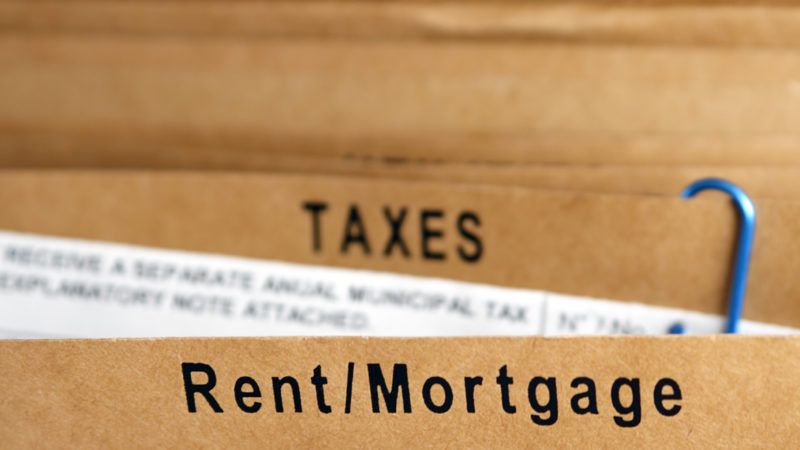With 30 Percent of Tenants Unable To Pay Their Bills This Month Due to COVID-19, Many Want Rent Canceled
Alexandria, Virginia, is the latest city to entertain demands to cancel rent payments during the current pandemic.

There's no doubt that renters and homeowners alike have been hit hard by the COVID-19 pandemic and related economic shutdown. The Wall Street Journal reports that nearly one-third of renters were late on their rent this month, while a survey from rental listing website ApartmentList found that a full quarter of households couldn't pay all of their housing costs.
Localities, state governments, and federal agencies have so far responded with suspensions on evictions and foreclosures, and mortgage forbearance. With the end to the current economic shutdowns nowhere in sight, however, politicians and activists are starting to clamor for more radical solutions.
On Tuesday, City Councilman Canek Aguirre of Alexandria, Virginia, introduced a resolution demanding Gov. Ralph Northam, a Democrat, and the area's congressional delegation use all powers at their disposal to cancel rent and mortgage obligations for the duration of the current crisis.
"No resident who has lost income should be required to pay rent during this public health emergency, nor should they accumulate debt for unpaid rent," reads Aguirre's resolution. It's not the first of its kind.
The Seattle City Council voted unanimously at the end of March in favor of a similar nonbinding resolution demanding that Washington Gov. Jay Inslee, a Democrat, and/or President Donald Trump use emergency powers to cancel rent and mortgage payments. The San Francisco Board of Supervisors did the same, although Mayor London Breed returned the resolution unsigned last Friday.
There's active legislation in the New York legislature to waive residential and commercial rents for 90 days, as well as mortgage payments for landlords who lose out on rental income as a result of the legislation.
Even Sen. Rick Scott (R–Fla.) has proposed a federal postponement of rents for 60 days for those making less than $75,000 a year.
Some renters have started to take things into their own hands too, with media outlets reporting a steady stream of stories about tenants organizing rent strikes.
So far, however, tenants' obligations to pay rent remain intact. Efforts to waive them could run into some serious constitutional problems says Ethan Blevins, an attorney with the Pacific Legal Foundation.
"There's a doctrine of necessity in Fifth Amendment takings cases. The question is, was this necessary to prevent an imminent disaster?" Blevins tells Reason. Closing businesses or commandeering a building to use as a medical facility would fit that bill, he says. Suspending evictions is a more questionable move, while forgiving rent altogether likely crosses a constitutional line.
"Totally suspending rent that never has to be repaid really isn't related to preventing an imminent disaster," says Blevin. "It's not really proportional."
At a minimum, he argues, governments that do suspend rent payments will owe landlords compensation for depriving them of the ability to make any economic return off their property. Not being able to charge rent obviously means property owners won't receive any rental income, while eviction moratoriums mean they can't convert their property to some other economic use either.
Constitutional questions aside, rent forgiveness is hardly ideal policy, says Michael Hendrix, state and local policy director for the Manhattan Institute.
"What we're talking about in terms of government measures to alleviate rent burdens, they exist on a pretty wide spectrum," Hendrix told Reason last month. "Wiping away rent obligations, that exists in a different category than pausing rent payments and pushing them off toward some future point. That's very different from extending some sort of loan or cash to individuals to help them make rent."
There are two sides to every transaction, says Hendrix. Alleviating tenants' requirement to pay rent effectively shifts this cost onto landlords, who often have their own costs in the form of loans, utility payments, and property taxes.
Some politicians pair their rent forgiveness measures with proposals to forgive mortgage payments. That might help landlords, but then merely shifts rent burdens onto banks and financial institutions who could then face liquidity problems.
While the government can shift housing costs from renters to less popular groups like landlords or banks, it can't make those costs disappear.
The best solution then is probably to let private parties work all this out among themselves through negotiation, not central planning dictates. The New York Times reported last week that amid of calls for rent forgiveness and eviction moratoriums, some landlords are taking it upon themselves to temporarily reduce rents or are using security deposits to cover tenants' bills.
Not every landlord is going to be able or willing to do that, leaving a lot of tenants in the lurch. To the degree that such a problem might necessitate government intervention, cash assistance is probably a better course of action than deciding who gets to short whom on their contractual obligations.
The more we lean on the government to adopt emergency rent forgiveness measures, the more damage it will likely do to housing markets. As we've seen from past crises, there's always the possibility that emergency measures persist long after a crisis ends.
"[It's] like pulling at the collar of a t-shirt," says Blevins. "It will stay loose. It will be hard to go back to the status quo. Governments will have a precedent to point to."
Rent Free is a weekly newsletter from Christian Britschgi on urbanism and the fight for less regulation, more housing, more property rights, and more freedom in America's cities.


Show Comments (61)